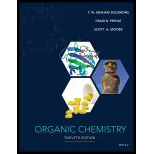
Interpretation:
The mechanism of the given reaction between 1,4-pentadiene and N- bromosuccinimide (NBS), initiated by photochemical energy is to be proposed.
Concept introduction:
舧 Electrophiles are electron-deficient species, which has positive or partially positive charge. Lewis acids are electrophiles, which accept electron pair.
舧 Nucleophiles are electron-rich species, which has negative or partially negative charge. Lewis bases are nucleophiles, which donate electron pair.
舧 Free radical is an atom, molecule or ion that has an unpaired electron, which makes it highly chemically reactive.
舧 Substitution reaction: A reaction in which one of the hydrogen atoms of a hydrocarbon or a
舧 Elimination reaction: A reaction in which two substituent groups are detached and a double bond is formed is called elimination reaction.
舧 Addition reaction: It is the reaction in which unsaturated bonds are converted to saturated molecules by the addition of molecules.
舧 The reaction in which there is addition of hydrogen molecule is called hydrogenation reaction.
舧
舧 Hydrogenation with platinum as a catalyst is used to convert unsaturated carbohydrates to saturated hydrocarbons
舧 Oxidation of
舧 Ozonolysis helps convert the carbon – carbon double bonds to carbon – oxygen double bond (carbonyl compounds).
舧 Dimethyl sulfide is used as a reducing agent that decomposes the intermediate formed into the carbonyl group.
舧 NBS (nitro-bromo succinimide) is a special reagent used for bromination of allylic carbocations.
舧 Bromine replaces the hydrogen attached to the carbon adjacent to the carbon bearing double bond.
舧 This method of using NBS can produce allylic bromides without bromine reacting with the double bond.
舧 Dehydration of a primary alcohol in the presence of a mineral acid like concentrated sulfuric acid results in the formation of alkene via E2 elimination.
舧 Allylic bromination is the replacement of the hydrogen bonded to the carbon adjacent to the carbon bearing double bond. N-bromosuccinimide is the reagent that can replace bromine gas, since bromine can replace the double bonds.
舧 Electrophilic addition reactions of alkadienes result in formation of products with different stereoisomers.
Want to see the full answer?
Check out a sample textbook solution
Chapter 13 Solutions
Organic Chemistry
- For the following reaction, list all expected organic and covalent products. This question does not require a mechanism, just the products. NANH2arrow_forwardProvide a detailed step-wise mechanism for the following reaction. Be sure to show all intermediates, formal charges, and show the movement of electrons with curved arrows.arrow_forwardsupply mechanisms for the following reactions showing all intermediates, all formal charges, and use arrows to show electron flowarrow_forward
- Predict the major products of the following reaction. If it is possible, write all stereoisomers.arrow_forward4. The reaction of the epoxide with methoxide produces one of the two constitutional isomers of methoxy-methylcyclopentanol shown below. Write the steps in the mechanism for this process. Be sure to show the following: (1) the structure of any intermediates that are formed during the mechanism, (2), what, if anything, is added or lost during each step of the mechanism, (3) any non-zero formal charges found on the structures that you write. REMEMBER: You may not use any materials except those that are given in the equation. OH H₂C * F OH NaOME/McOHarrow_forwardPredict the intermediates and final product. Provide a rational mechanism.arrow_forward
- Draw the structure of the product of each step in the three-step synthesis. Show the formal charges, if applicable. As a start, the benzene ring is drawn for you in each product. Although the first step produces a mixture of isomers, the para isomer is isolated as the sole product of interest and used in the second step. Give only the major product for the second and third steps. Br₂ FeBr HNO3 H2SO4 Br₂. FeBra Product 1 Product 2 Product 3 (para isomer) Draw product 1. Select Draw Templates More с H Br Draw product 2. Erase Select Draw Templates More c Q2Q Draw product 3. Select Draw Templates More с H N о Br Erase c Q2 Q + CH N о Br Erase QQQarrow_forwardFor each of the following, write the major product(s) and then draw out each step in the mechanism using curved arrows. Show ALL lone pair electrons and formal charges. Redraw ALL molecules as to show explicitly ALL bonds being broken or formed. Identify the molecular orbital (HOMO) of the nucleophile and the molecular orbital (LUMO) of electrophile involved in the nucleophilic attack. MO diagrams are not necessary..arrow_forwardUsing cyclohexane as your starting material, show how you would synthesize each of the following compounds. (Onceyou have shown how to synthesize a compound, you may use it as the starting material in any later parts of this problem.)(a) bromocyclohexanearrow_forward
- 4. Synthesis Using the carbon-containing starting material(s), propose a synthesis by drawing structures for all intermediates. The carbon atoms in the product must originate from the starting material(s) (or a carbene/carbenoid or CO₂), but you may use as many equivalents of each starting material as you would like, and any reagent/reaction you know. (note: no mechanisms are required). (a) || محمد barrow_forwardDraw the mechanism and the energy diagram for the reaction shown below. Include any resonance structures for the intermediates of the reaction. H3O+arrow_forwardProvide the major organic product(s) of the reaction shown below. H₂C CH3 HNO₂, H₂SO₂arrow_forward
 ChemistryChemistryISBN:9781305957404Author:Steven S. Zumdahl, Susan A. Zumdahl, Donald J. DeCostePublisher:Cengage Learning
ChemistryChemistryISBN:9781305957404Author:Steven S. Zumdahl, Susan A. Zumdahl, Donald J. DeCostePublisher:Cengage Learning ChemistryChemistryISBN:9781259911156Author:Raymond Chang Dr., Jason Overby ProfessorPublisher:McGraw-Hill Education
ChemistryChemistryISBN:9781259911156Author:Raymond Chang Dr., Jason Overby ProfessorPublisher:McGraw-Hill Education Principles of Instrumental AnalysisChemistryISBN:9781305577213Author:Douglas A. Skoog, F. James Holler, Stanley R. CrouchPublisher:Cengage Learning
Principles of Instrumental AnalysisChemistryISBN:9781305577213Author:Douglas A. Skoog, F. James Holler, Stanley R. CrouchPublisher:Cengage Learning Organic ChemistryChemistryISBN:9780078021558Author:Janice Gorzynski Smith Dr.Publisher:McGraw-Hill Education
Organic ChemistryChemistryISBN:9780078021558Author:Janice Gorzynski Smith Dr.Publisher:McGraw-Hill Education Chemistry: Principles and ReactionsChemistryISBN:9781305079373Author:William L. Masterton, Cecile N. HurleyPublisher:Cengage Learning
Chemistry: Principles and ReactionsChemistryISBN:9781305079373Author:William L. Masterton, Cecile N. HurleyPublisher:Cengage Learning Elementary Principles of Chemical Processes, Bind...ChemistryISBN:9781118431221Author:Richard M. Felder, Ronald W. Rousseau, Lisa G. BullardPublisher:WILEY
Elementary Principles of Chemical Processes, Bind...ChemistryISBN:9781118431221Author:Richard M. Felder, Ronald W. Rousseau, Lisa G. BullardPublisher:WILEY





